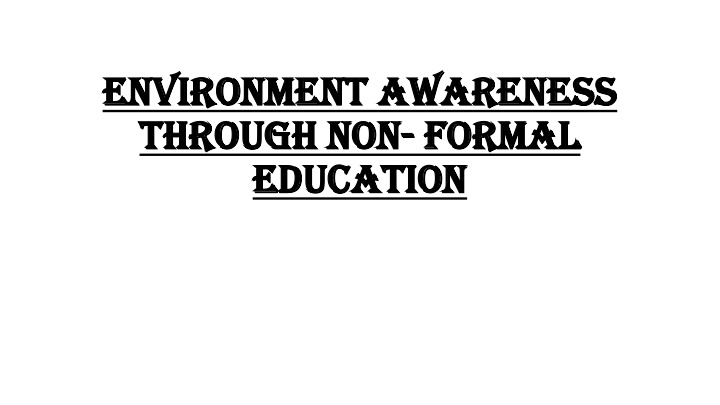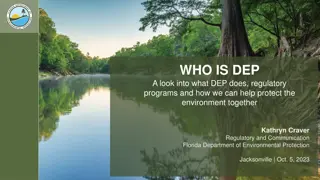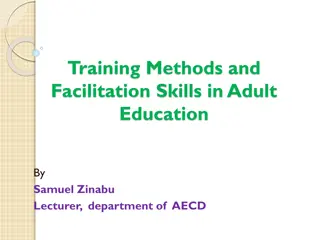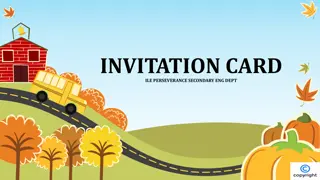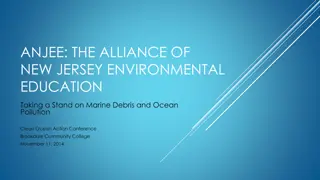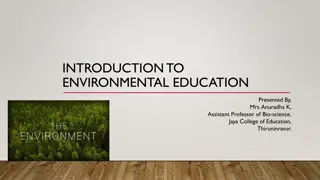Enhancing Environmental Awareness Through Non-Formal Education Initiatives
Non-formal education plays a crucial role in enhancing environmental awareness through programs such as eco-clubs, population education initiatives, and the National Green Corps. These initiatives aim to educate individuals, especially children, about environmental issues, leading to better decision-making and active participation in conservation efforts. Through activities like eco-clubs and awareness campaigns, people are encouraged to join NGOs and support green policies. Overall, non-formal education complements formal schooling by providing structured learning outside the traditional education system, fostering a deeper understanding of environmental conservation.
Download Presentation

Please find below an Image/Link to download the presentation.
The content on the website is provided AS IS for your information and personal use only. It may not be sold, licensed, or shared on other websites without obtaining consent from the author.If you encounter any issues during the download, it is possible that the publisher has removed the file from their server.
You are allowed to download the files provided on this website for personal or commercial use, subject to the condition that they are used lawfully. All files are the property of their respective owners.
The content on the website is provided AS IS for your information and personal use only. It may not be sold, licensed, or shared on other websites without obtaining consent from the author.
E N D
Presentation Transcript
ENVIRONMENT AWARENESS ENVIRONMENT AWARENESS THROUGH NON THROUGH NON- - FORMAL EDUCATION EDUCATION FORMAL
What is Non formal What is Non formal education education Non-formal education is a loosely defined term that refers to schooling that takes place outside the formal education system. Non-formal education includes programs that do not have or provide formal certification or curriculum, but have more structure than informal learning, which refers to learning absorbed from daily experience.
It is imparted through It is imparted through various means like various means like: : Eco-clubs Population education programmes Adult education Mass-Media and Social Media Established of Greenbelts Campaign through state transport
ENVIRONMENT AWARENESS ENVIRONMENT AWARENESS THROUGH ECO THROUGH ECO- -CLUBS Public awareness programmes for conservation of environment can be done by students at school, nagar or colony level. For this students can form Eco-clubs of like responsible and disciplined people. Non-governmental organisations like NATURE CLUBS, SCIENCE CLUBS etc. can generate environmental awareness like Nukkad Natak, Nautankies can be organised to sensitize the people. The concepts of birthday tree and marriage ceremony tree can also be promoted. People are encouraged to join NGOs supporting conservation and making green policies. CLUBS
AWARENESS THROUGH THE AWARENESS THROUGH THE NATIONAL GREEN CORPS NATIONAL GREEN CORPS The ministry of environment and forest started National Green Corps (NGC) Programme in 2001-2002. THE BASIC OBJECTIVES OF NGCs are: To make children understand environment and environmental problems To provide environmental education opportunities for school children. To facilitate children s participation in decision making in areas related to environment and development To bring children into direct contact with the environmental problems facing the society they live in and make them think of solutions To involve children in action based programmes related to environment in their surroundings.
ENVIRONMENT AWARENESS ENVIRONMENT AWARENESS THROUGH POPULATION EDUCATION THROUGH POPULATION EDUCATION PROGRAMMES PROGRAMMES Educating people about human population :- relationships between economic, social, cultural and biological processes that influence a population. Impact of the growth of human population on natural resources. Reproductive health Of man and women. Incorporates sex education which is essential for good reproductive health and maintaining the size of the family for a better environment.
ENVIRONMENT AWARENESS ENVIRONMENT AWARENESS THROUGH ADULT EDUCATION THROUGH ADULT EDUCATION Every house in the village should have a soak pit and water should not be allowed to spread in front of the houses. The Water of Wells, ponds, and rivers should not be polluted by bathing animals or dumping garbage in them. Water conservation techniques should be taught. Tree plantation should be encouraged in and around villages. Solar energy should be encouraged for light and cooking purposes. Methods of recycling should be taught. Pesticides and fertilizers should be used in appropriate quantities.
